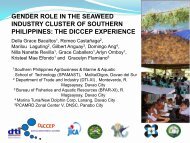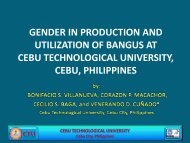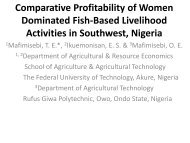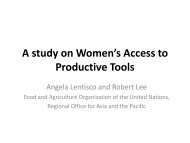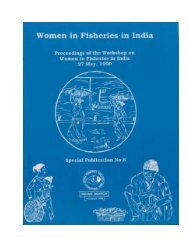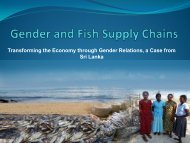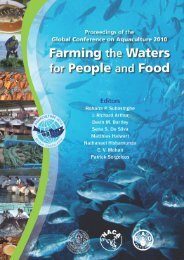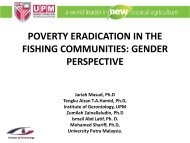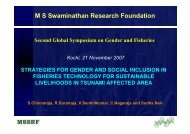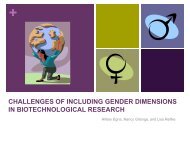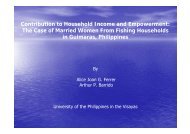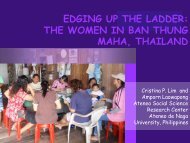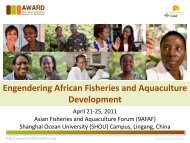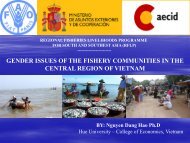Moving the Agenda Forward - GENDER IN AQUACULTURE AND ...
Moving the Agenda Forward - GENDER IN AQUACULTURE AND ...
Moving the Agenda Forward - GENDER IN AQUACULTURE AND ...
Create successful ePaper yourself
Turn your PDF publications into a flip-book with our unique Google optimized e-Paper software.
Asian Fisheries Science Special Issue Vol.25S (2012):1-13 3We have also witnessed <strong>the</strong> phenomenon of women and gender specialists in social scienceresearch departments moving on from studying aquaculture and fisheries to studies in o<strong>the</strong>r sectorsor overarching <strong>the</strong>mes such as climate change and women’s mobility. Some among us are part ofthis shift. In order to flourish, any field of research and education needs resources – researchers,funds, students. Like o<strong>the</strong>r researchers, women and gender researchers and students “follow <strong>the</strong>money.” Because gender and fish sector funding is minimal, some of <strong>the</strong> most significantresearchers in <strong>the</strong> field have moved on to study gender in o<strong>the</strong>r fields.To compound <strong>the</strong> problem of low support, many researchers and activists have beendisheartened because <strong>the</strong>ir advice was rarely sought, or accepted and used when given. For example,inshore fishers, and especially women, warned that <strong>the</strong> North Atlantic cod stocks were in declineyears ahead of Canadian government recognition of <strong>the</strong> crisis (Neis, 2000, Grzetic, 2004).Development assistance agencies often fund research and <strong>the</strong>n <strong>the</strong>y use <strong>the</strong> results to inform<strong>the</strong>ir actions or set new programme directions. Few aquaculture and fisheries projects, however,have gender components and hence development assistance agencies are providing little support toresearch in gender in aquaculture and fisheries. A current exception is <strong>the</strong> FAO-Spain RegionalFisheries Livelihoods Programme (see papers by Lentisco and Arenas, Nguyen Dang Hao andSegundia et al. in <strong>the</strong> current Special Issue).The lack of attention to gender in fish sector projects could be partly compensated byborrowing from gender work in o<strong>the</strong>r rural sectors. The quantum of gender and agriculture workseems to be increasing since FAO highlighted <strong>the</strong> “gender gap in agriculture” in its State of Foodand Agriculture report (FAO, 2011). The report also touched lightly on aquaculture and fisheries.Following this report, more attention to women in agriculture is evident among <strong>the</strong> multi-lateraldevelopment agencies such as FAO, <strong>the</strong> International Fund for Agricultural Development ( IFAD)and <strong>the</strong> World Bank. Several new electronic platforms have been created to promote gender andagriculture research and action, and o<strong>the</strong>r significant development actors have distilled practicallessons learned from helping women, e.g., Anonymous (2012). In March 2012, <strong>the</strong> Indian Councilfor Agricultural Research and several international professional bodies sponsored <strong>the</strong> first GlobalConference on Women in Agriculture. Agriculture researchers are addressing land rights issues forwomen, measuring women’s empowerment and assets and mapping women’s activities. The fishsector was acknowledged to some extent in <strong>the</strong> 2012 Global Conference on Women in Agriculture.We cannot take for granted that this flurry of attention to women in agriculture will alsostimulate more research and action on aquaculture and fisheries. It is, however, a positivedevelopment that should be harnessed. Choo et al. (2008) pointed out that fisheries and aquacultureare influenced ultimately by global trends in development. So far, no large scale quantitative studyon gender and fisheries has been conducted in any part of <strong>the</strong> world, unlike on gender andagriculture.



